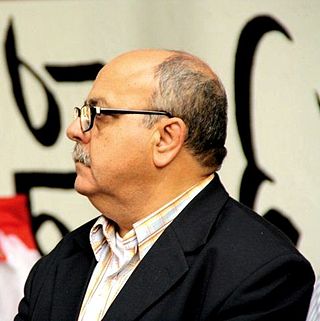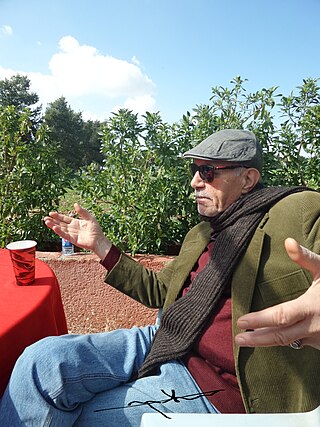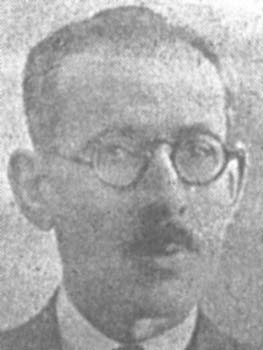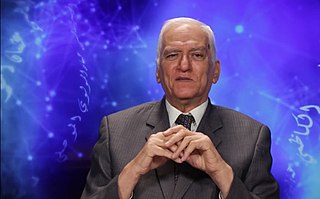Abdul Rahman bin Ibrahim al-Munif, also known as Abdelrahman Munif, was a novelist, short story writer, memoirist, journalist, thinker, and cultural critic. He is considered one of the most significant authors in the Arabic language of the 20th century. His novels include strong political elements as well as mockeries of the Middle Eastern elite classes. He is best-known for Cities of Salt, a quintet of novels about how the discovery of oil transformed a traditional Bedouin culture. Munif's work offended the rulers of Saudi Arabia, which led to the banning of many of his books and the revocation of his Saudi Arabian citizenship.

Muhammad Baqir al-Sadr, also known as al-Shahid al-Khamis, was an Iraqi Islamic scholar, philosopher, and the ideological founder of the Islamic Dawa Party, born in al-Kadhimiya, Iraq. He was father-in-law to Muqtada al-Sadr, a cousin of Muhammad Sadeq al-Sadr and Imam Musa as-Sadr. His father Haydar al-Sadr was a well-respected high-ranking Shi'a cleric. His lineage can be traced back to Muhammad through the seventh Shia Imam Musa al-Kazim. Muhammad Baqir al-Sadr was executed in 1980 by the regime of Saddam Hussein along with his sister, Amina Sadr bint al-Huda.
Mohamed Zafzaf was a Moroccan Arabic-language novelist and poet. He played a pivotal role in the development of Moroccan literature in the second half of the 20th century and, due to his contributions, came to be known by such titles as "the godfather of Moroccan literature", "the Moroccan Tolstoy", "the Moroccan Dostoyevsky" and as "our great author" among his Moroccan peers.
Abū al-Thanā’ Shihāb ad-Dīn Sayyid Maḥmūd ibn ‘Abd Allāh al-Ḥusaynī al-Ālūsī al-Baghdādī was an Iraqi Islamic scholar best known for writing Ruh al-Ma`ani, an exegesis (tafsir) of the Qur'an.
Nazik al-Malaika was an Iraqi poet. Al-Malaika is noted for being among the first Arabic poets to use free verse.

Sinan Antoon, is an Iraqi poet, novelist, scholar, and literary translator. He has been described as "one of the most acclaimed authors of the Arab world." Alberto Manguel described him as "one of the great fiction writers of our time.” He is an associate professor at the Gallatin School of Individualized Study at New York University.
Fawwaz Ahmad Tuqan is a Joardanian-Palestinian poet, novelist and professor. He was born on 6 September 1940 to a Palestinian family in Jerusalem. His father is Ahmad Abdul Fattah Tuqan, a former Prime Minister of Jordan.

Abdulrazak Eid, Abdul razzak Eid, Abdul razaq Eid, Abdel razzak Eid, Abdul razzaq Eid, or Abd al Razzaq 'Id is a Syrian writer and thinker and one of Syria's leading reformers. He helped to found the Committees of Civil Society in Syria, drafted the Statement of 1000 and helped to draft the Damascus Declaration. Because of his opposition writings and political actions, he was arrested many times in Syria, banned from working and traveling, kidnapped by the Syrian intelligence forces, and was threatened with being assassinated. He fled Syria in 2008 for exile in Europe where he was elected president of the National Council of Damascus Declaration in exile.

Khairy Alzahaby was a Syrian novelist, historian, columnist, and scenarist.

Youssef Rakha is an Egyptian writer. His work explores language and identity in the context of Cairo, and reflects connections with the Arab-Islamic canon and world literature. He has worked in many genres in both Arabic and English, and is known for his essays and poems as well as his novels.
Mahmoud Kassem was an Alexandria-born writer, translator, film critic, and professor. He is best known for his literary verses of children's books, novels, essays, and literary and artistic encyclopaedias. He has received numerous Egyptian and Arabic awards in children's writing and radio drama, most recently the Best Literary Study Award entitled "Arabic Literature Written in French."
Ziyad Jamil Abdel Fattah is a Palestinian politician, writer, journalist and novelist, born in Tulkarm, Palestine. He is one of the leaders of the Fatah movement, founder of the Palestinian News Agency, a member of the Palestinian National Council in the Palestine Liberation Organization for several sessions, and the former president of Federation of Arab News Agencies (FANA), the Palestinian General Authority for Consultations, and the Palestinian National Library. Abdel Fattah was very close to late president Yasser Arafat, and he witnessed all the events on his side. Abdel Fattah has been dubbed "the legend of the Palestinian revolution media."

Mahmoud Saeed al-Karmi was a Palestinian writer, scholar of Arabic language, poet, and political journalist. He is considered one of the Symbols of the national movement in Palestine and Jordan. He was born in Tulkram in Palestine for well-known family, his father is Saeed Alkarmi, his brothers are, Abdulkareem, Hassan, Abd al-Ghani and Ahmad Shakir. He was Graduated from Al Azhar in Arabic language. He worked in Arabic language field in Egypt and Eritrea, Somalia, Syria, Palestine, Lebanon and Jordan for many years. He worked also in Journalism. He was assassinated by his political opponents in Beirut.
Muhammad Sa'id al-Saggar was an Iraqi poet and calligrapher. He was born in Miqdadiyah in the Diyala Governorate in 1934. He used to be a painter; he ran a publishing house in Paris since 1978, and has been a journalist since 1955. He published his literature and critical articles in many newspapers and magazines. He has published over 14 books of poetry, theatre, the short story, linguistics, art, and other disciplines. He is arguably the most distinguished Iraqi artist-calligrapher in the 21st century. al-Saggar died in Paris on March 23, 2014.
Mahmoud El-Saadany, also transliterated as Mahmud Al-Saadani or al or el Saadani or Sa'dani was an Egyptian satirical writer and journalist. He is considered one of the pioneers of satirical writing in the Arab press. He is the older brother of the actor Salah El-Saadany. He participated in editing and founding a large number of Arab newspapers and magazines in Egypt and abroad. He headed the editorship of Sabah Al-Khair, an Egyptian magazine in the sixties. As a Nassirist, he also participated in political life during the reign of President Gamal Abdel Nasser, and was imprisoned during the reign of Anwar Sadat after he was convicted of participating in a coup attempt.
Mahmoud Al-Wardani is an Egyptian writer, novelist, storyteller and journalist. He participated in the October War in 1973, co-founded the newspaper Akhbar Al-Adab. Some of his short stories where translated to French and English.
Youssef Izz al-Din Ahmad al-Samarrai was an Iraqi poet and university professor. He was born and studied in the city of Baqubah. He worked as a primary teacher at the Primary Teacher's House, then joined the Faculty of Arts at Alexandria University where he obtained a BA in Arabic language and literature. Youssef Izz al-din has continued his studies there, receiving a master's degree, then a doctorate from the University of London. He was appointed as a teacher of modern Arabic literature at the College of Arts at the University of Baghdad. He was assigned to the iraqi scientific academy in 1961, then a general director of guidance at the ministry of culture. He was a member of the royal society of literature in London, and the scientific academy in Cairo, Damascus, Jordan, and Iraq. He has many poetry collections and a large number of books, studies and lectures that he delivered. He died in Britain.

Imad Abdul Salam Raouf was an Iraqi historian, investigator, and thinker.
Hani Muhammad-Ali al-Rahib was a Syrian novelist and literary academic who wrote a number of distinguished novels. The Defeated was his first novel, which was published in 1961 when he was 22 years old. In the same year, he won the Al-Adab magazine literature award. His second novel was titled A Crack in a Long History (1970) then came A Thousand and Two Nights in 1977, followed in the early 1980s by The Epidemic, which some critics chose as one of the 100 most important Arab novels published in the twentieth century, according to Al-Faisal Magazine.
10 Books That Were Almost Lost to History: Saddam City (I Am the One Who Saw) by Mahmoud Saeed Saddam City is a scathing, Kafkaesque indictment against Saddam Hussein's regime and the modern world's tendency to drift toward tyranny. Saeed, who was a political prisoner three times over and whose work was often banned or destroyed, hid the early unpublished pages of this novel (along with remarkable others) in plastic bags in the tank of his toilet before fleeing Iraq with them.







